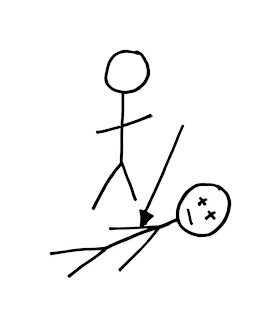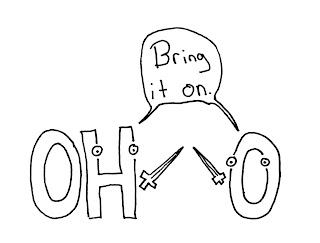A Visit to the DMV
C.S. Lewis pictured Hell as a place where rain falls through houses and a trip to see Napoleon mutter to himself takes several million years. Homer's version saw insubstantial figures rehashing earthly grievances and fighting to drink blood. Dante's account punished his contemporary and historical hate lists with fire, ice, and Satan skull-gnawing.
It's T.S. Eliot's "Hollow Men" that most reminds me of the Department of Motor Vehicles, however.
Like many people, I have my share of DMV anecdotes. At age seventeen, when I went to take my driving test, I wound up with not one but two examiners in the car with me.
They argued. The entire time.
When I finally moved out of my parents' house, my dad and I went to the DMV so we could switch the car to my name and I could update my license. This resulted in a double-whammy of creepiness.
License Update:
Car Title:
Thus is was with some trepidation that I dreaded my recent DMV excursion to update my license again. Unlike the previous times, which required a trip to the large facility several miles down the road, I went to the one a few blocks from where I live.
This visit was particularly unnerving.
First of all, there was the line.
Then there was the lady at the desk
... along with the cashier.
Waiting for my new license was likewise disturbing.
All in all, I was treated with courtesy and efficiency in an eight-minute trip.
Dear local DMV: you're doing it wrong, and it's creeping me out.
P.S. My husband has an idea for using the DMV to make people hate the government less. I think he's on to something.
Apparently, Julius Caesar is one step below Jesus.
Like many people, I have my share of DMV anecdotes. At age seventeen, when I went to take my driving test, I wound up with not one but two examiners in the car with me.
They argued. The entire time.
When I finally moved out of my parents' house, my dad and I went to the DMV so we could switch the car to my name and I could update my license. This resulted in a double-whammy of creepiness.
License Update:
Car Title:
Thus is was with some trepidation that I dreaded my recent DMV excursion to update my license again. Unlike the previous times, which required a trip to the large facility several miles down the road, I went to the one a few blocks from where I live.
This visit was particularly unnerving.
First of all, there was the line.
Then there was the lady at the desk
... along with the cashier.
Waiting for my new license was likewise disturbing.
All in all, I was treated with courtesy and efficiency in an eight-minute trip.
Dear local DMV: you're doing it wrong, and it's creeping me out.
P.S. My husband has an idea for using the DMV to make people hate the government less. I think he's on to something.
How (Not) to Ask for Help
Whenever I think of asking others for assistance, I picture my ancient languages professor demonstrating the Greek art of supplication. He was almost as old as languages he taught, so the process always made us students nervous.
He always did make it back up -- eventually -- after he explained the rest of the process. The one asking for help (known by the fancy-shmancy term "suppliant") grasped the knees of the other person and then made a request. This could be either awesome or awkward for those involved.
Sometimes the request was successful
... and sometimes not.
I wouldn't recommend trying the knee-clasp in this day and age (be sure to let me know how it goes if you make the attempt, though), but I can give some advice for the modern era, particularly regarding what techniques to avoid. Stay away from the following:
1. Downplaying the other person's busyness.
Bad:
Better:
2. Insinuating that this is a favor to them.
Bad:
Better:
3. Not actually asking
Bad:
Better:
4. Phrasing an order as a question
Bad:
Better:
I'm sure that I have missed some other standard annoyances, so list your pet peeves about help requests in the comments below! <-- Shameless plug; it's been nearly a year since the last comment on this blog.
He always did make it back up -- eventually -- after he explained the rest of the process. The one asking for help (known by the fancy-shmancy term "suppliant") grasped the knees of the other person and then made a request. This could be either awesome or awkward for those involved.
Sometimes the request was successful
... and sometimes not.
I wouldn't recommend trying the knee-clasp in this day and age (be sure to let me know how it goes if you make the attempt, though), but I can give some advice for the modern era, particularly regarding what techniques to avoid. Stay away from the following:
1. Downplaying the other person's busyness.
Bad:
Better:
2. Insinuating that this is a favor to them.
Bad:
Better:
3. Not actually asking
Bad:
Better:
4. Phrasing an order as a question
Bad:
Better:
I'm sure that I have missed some other standard annoyances, so list your pet peeves about help requests in the comments below! <-- Shameless plug; it's been nearly a year since the last comment on this blog.
“O” versus “Oh” (or, How to Write Direct Address in a Praise Song)
One of the oddities of the English language is that an
unspoken letter can wield tremendous power.
Such is the case of “Oh” versus “O.”
You see, “O” is used to show that someone is being spoken to
directly. Today this is used almost exclusively in formal contexts.
“Oh,” on the other hand, is an interjection that can express
anything from a topic change
to surprise
to disappointment.
Once upon a time, spelling anything in English was a largely arbitrary endeavor, and
historical examples of a vocative “Oh” exist. However, until I invent a time
machine, I’ll keep cringing when I see the two words confused.
This is especially true in venues of worship.
The polite way to invoke one’s deity uses “O.”
By contrast, the only justification for “Oh my God” in a
praise song involves using the first word as an interjection of dismay.
In sum:
“O God!” =
appropriate when calling upon one’s deity.
“Oh, God!” = appropriate when 1. Complaining to one’s deity
about said praise song 2.Taking the name
of one’s deity in vain*
*which is actually never appropriate. Shame on you.
Subscribe to:
Posts (Atom)






















































